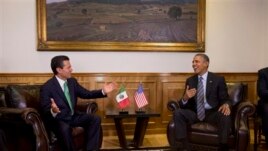North American Leaders Meet in Mexico Print Comment Share: President Barack Obama meets with Mexican President Enrique Peña Nieto, state government palace, Toluca, Mexico, Feb. 19, 2014. President Barack Obama meets with Mexican President Enrique Peña Nieto, state government palace, Toluca, Mexico, Feb. 19, 2014. Pin It TEXT SIZE VOA News February 19, 2014 The U.S., Canadian and Mexican leaders are holding a summit Wednesday, with agreement on a Pacific Rim trade pact at the top of their agenda. U.S. President Barack Obama and Canadian Prime Minister Stephen Harper are meeting with Mexican President Enrique Pena Nieto at an ornate government complex in Toluca, Mexico, at the North American Leaders' Summit. Twenty years after the countries agreed to the North American Free Trade Agreement, the economies of the three nations are often linked. But they are facing new difficulties in reaching a united front in negotiations to complete the 12-nation Trans-Pacific Partnership, largely because of political concerns Obama faces in Washington. Completion of the Pacific trade pact could bolster North America's standing in the global economy, and Obama supports completion of the deal by the end of 2014. But he faces opposition from lawmakers in his own Democratic Party who oppose the White House call for "fast track" authority that would block amendments to the trade deal during the congressional approval process. The three leaders are also expected to discuss energy, security and immigration issues, with American political divisions again limiting Obama's ability to reach accord with his North American counterparts. Harper has voiced frustration at the length of time it has taken Obama to decide whether to approve the controversial Keystone XL oil pipeline that would stretch nearly 1,900 kilometers from Canada's oil sands to refineries in the U.S. state of Texas. U.S. environmentalists are opposing the project, now in its sixth year of review. U.S. immigration reforms are stalled in Congress. Obama's political opponents say the country's borders with Mexico are not secure and are objecting to opening the possibility for citizenship for the 11 million undocumented immigrants already in the U.S., most of them from Mexico and Central America. Some information for this report comes from AP and AFP.
North American Leaders Meet in Mexico
The U.S., Canadian and Mexican leaders are holding a summit Wednesday, with agreement on a Pacific Rim trade pact at the top of their agenda.
U.S. President Barack Obama and Canadian Prime Minister Stephen Harper are meeting with Mexican President Enrique Pena Nieto at an ornate government complex in Toluca, Mexico, at the North American Leaders' Summit.
Twenty years after the countries agreed to the North American Free Trade Agreement, the economies of the three nations are often linked. But they are facing new difficulties in reaching a united front in negotiations to complete the 12-nation Trans-Pacific Partnership, largely because of political concerns Obama faces in Washington.
Completion of the Pacific trade pact could bolster North America's standing in the global economy, and Obama supports completion of the deal by the end of 2014.
But he faces opposition from lawmakers in his own Democratic Party who oppose the White House call for "fast track" authority that would block amendments to the trade deal during the congressional approval process.
The three leaders are also expected to discuss energy, security and immigration issues, with American political divisions again limiting Obama's ability to reach accord with his North American counterparts.
Harper has voiced frustration at the length of time it has taken Obama to decide whether to approve the controversial Keystone XL oil pipeline that would stretch nearly 1,900 kilometers from Canada's oil sands to refineries in the U.S. state of Texas. U.S. environmentalists are opposing the project, now in its sixth year of review.
U.S. immigration reforms are stalled in Congress. Obama's political opponents say the country's borders with Mexico are not secure and are objecting to opening the possibility for citizenship for the 11 million undocumented immigrants already in the U.S., most of them from Mexico and Central America.
Some information for this report comes from AP and AFP.
U.S. President Barack Obama and Canadian Prime Minister Stephen Harper are meeting with Mexican President Enrique Pena Nieto at an ornate government complex in Toluca, Mexico, at the North American Leaders' Summit.
Twenty years after the countries agreed to the North American Free Trade Agreement, the economies of the three nations are often linked. But they are facing new difficulties in reaching a united front in negotiations to complete the 12-nation Trans-Pacific Partnership, largely because of political concerns Obama faces in Washington.
Completion of the Pacific trade pact could bolster North America's standing in the global economy, and Obama supports completion of the deal by the end of 2014.
But he faces opposition from lawmakers in his own Democratic Party who oppose the White House call for "fast track" authority that would block amendments to the trade deal during the congressional approval process.
The three leaders are also expected to discuss energy, security and immigration issues, with American political divisions again limiting Obama's ability to reach accord with his North American counterparts.
Harper has voiced frustration at the length of time it has taken Obama to decide whether to approve the controversial Keystone XL oil pipeline that would stretch nearly 1,900 kilometers from Canada's oil sands to refineries in the U.S. state of Texas. U.S. environmentalists are opposing the project, now in its sixth year of review.
U.S. immigration reforms are stalled in Congress. Obama's political opponents say the country's borders with Mexico are not secure and are objecting to opening the possibility for citizenship for the 11 million undocumented immigrants already in the U.S., most of them from Mexico and Central America.
Some information for this report comes from AP and AFP.


Comments